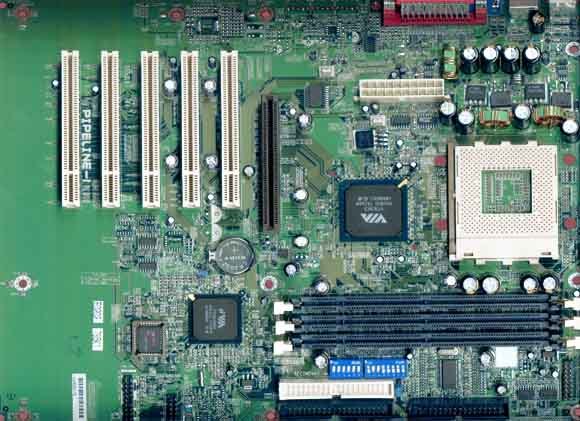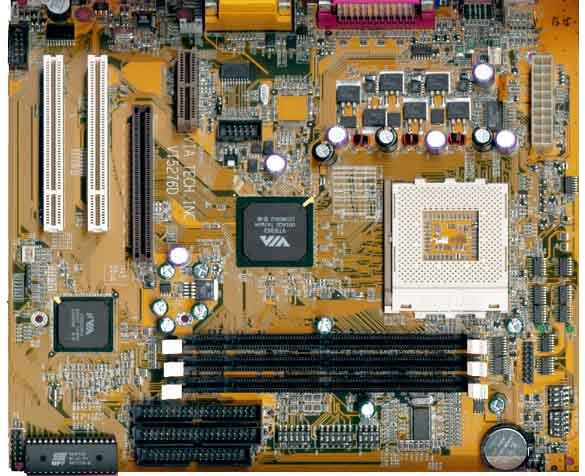AMD's Thunderbird finally fully fledged
The Chipsets
For the time being, the choice of chipsets for the new Thunderbird isn't big. AMD announced proudly that their rather old and almost outdated 750 chipset is able to support Thunderbird, but the much newer Apollo KX133 chipset from VIA seems to have problems with the new AMD processor. Therefore VIA created the Apollo KT133, which is nothing different, than a KX133-chipset with SocketA-support, so please don't expect any new features. KT133 was recently renamed after from 'KZ133', because the combination 'KZ' is in bad memory to millions of people worldwide.
AMD is currently working on the successor of the 750 chipset, which will carry the 'surprising' name 'AMD 760'. This chipset is expected to support DDR-SDRAM, which is why there are high expectations into systems that come with Thunderbird and the new AMD chipset. Obviously we should not expect those new platforms before August or even September 2000.
Test Motherboards For Thunderbird
By the time of the test we had three different SocketA-motherboards with VIA's Apollo KT133 chipset available for our 1 GHz Thunderbird. One was the motherboard out of the official AMD evaluation system, which turned out to be an OEM-product from Compaq by the name of 'Pipeline-1', of which we heard the rumor that it is manufactured by Asus.
Unfortunately this board wouldn't leave any room whatsoever for any kind of tweaking, which is not exactly surprising for an OEM-product. We weren't even able to adjust the memory timing.
The second motherboard came directly from VIA and is the official KT133 reference platform VT5276D. Our tests showed that this board would produce the best results, which is why we used it for our testing suite.
Finally we had the chance to try MSI's K7T Pro. This board seemed to be in a too early stage for testing, because the results it scored could not live up to its competitors from above.
Benchmark Setup
As in the recent Solano-article we made sure that our test results were comparable to the scores produced for the 'Giga-Battle ' article, which is why we used NVIDIA's rev. 5.08 drivers once more. It is still a fact that all later drivers are slower than revision 508, which is why we felt good about using it.
Get Tom's Hardware's best news and in-depth reviews, straight to your inbox.
| AMD Athlon Platform Information | |
|---|---|
| Graphics card for all tests | NVIDIA GeForce 256120 MHz Core, 300 MHz DDR-RAM 32 MB |
| Hard Drive for all tests | Seagate Barracuda ATA ST320430A |
| CPU for all tests | Athlon with Thunderbird core / Athlon with 'old' core, 1 GHz |
| VIA Apollo KT133 Chipset | |
| Motherboard | VIA KT133 Reference Board VT 5276D |
| Memory | 128 MB, Micron PC133 SDRAM CAS2 |
| Network | 3Com 3C905B-TX |
| VIA Apollo KX133 Chipset | |
| Motherboard | Asus K7V, BIOS May 2000 |
| Memory | 128 MB, Enhanced Memory Systems PC133 HSDRAM CAS2 |
| Network | 3Com 3C905B-TX |
| AMD 750 'Irongate' Chipset | |
| Motherboard | Asus K7M, rev. 1.04, Chipset rev. C6, Super Bypass Enabled, ACPI BIOS 128 beta (02.03.2000), AGP2x enabled in GeForce driver (IrongateEnable2x=1) |
| Memory | 128 MB, Micron PC133 SDRAM CAS2 |
| Network | 3Com 3C905B-TX |
| Intel Pentium III Platform Information | |
| Graphics card for all tests | NVIDIA GeForce 256120 MHz Core, 300 MHz DDR-RAM 32 MB |
| Hard Drive for all tests | Seagate Barracuda ATA ST320430A |
| CPU for all tests | Intel Pentium III 1 GHz, 133 MHz FSB |
| Intel i815 Chipset Pre-Release Stepping A2 | |
| Motherboard | No Information |
| Memory | 128 MB, Wichmann WorkX MXM128 PC133 SDRAM CAS2 |
| IDE Interface | onboard |
| Network | 3Com 3C905B-TX |
| VIA Apollo Pro 133A Chipset | |
| Motherboard | Asus P3V4X, ACPI BIOS 1002 final, March 2000 |
| Memory | 128 MB, Enhanced Memory Systems PC133 HSDRAM CAS2 |
| Network | 3Com 3C905B-TX |
| Intel 440 BX Chipset | |
| Motherboard | Asus P3B-F, ACPI BIOS 1005 beta 01, March 2000 |
| Memory | 128 MB, Enhanced Memory Systems PC133 HSDRAM CAS2 |
| IDE Interface | Promise Ultra66 PCI card |
| Network | 3Com 3C905B-TX |
| Intel 820 Chipset | |
| Motherboard | Asus P3C-L, ACPI BIOS 1020 beta 05, March 2000 |
| Memory | 128 MB, Samsung PC800 RDRAM, RDRAM clock adjusted in BIOS |
| IDE Interface | onboard |
| Network | Onboard i82559 |
| Intel 840 Chipset | |
| Motherboard | OR840, special unreleased BIOS |
| Memory | 128 MB, Samsung PC800 RDRAM128 MB, Samsung PC700 RDRAM, running as PC600 RDRAM |
| IDE Interface | onboard |
| Network | Onboard i82559 |
| Driver Information | |
| Graphics Driver | NVIDIA 4.12.01.0508 |
| viagart.vxd for VIA Chipsets | AGP-driver 4.22 |
| ATA Driver | Promise Ultra66 driver rev. 1.43Intel Ultra ATA BM driver v5.00.038Latest VIA ATA BM Driver |
| Environment Settings | |
| OS Versions | Windows 98 SE 4.10.2222 AScreen Resolution 1024x768x16x85Screen Resolution 1280x1024x32x85 for SPECviewperf |
| DirectX Version | 7.0 |
| Quake 2 | Version 3.20command line = +set cd_nocd 1 +set s_initsound 0Crusher demo, 640x480x16 |
| Quake 3 Arena | Retail Versioncommand line = +set cd_nocd 1 +set s_initsound 0Graphics detail set to 'Normal', 640x480x16Benchmark using 'Q3DEMO1' |
| Expendable | Downloadable Demo Versioncommand line = -timedemo640x480x16 |
| Unreal Tournament | Ver. 4.05bhigh quality textures, medium quality skins, no tweaks640x480x16Benchmark using 'UTBench' |

